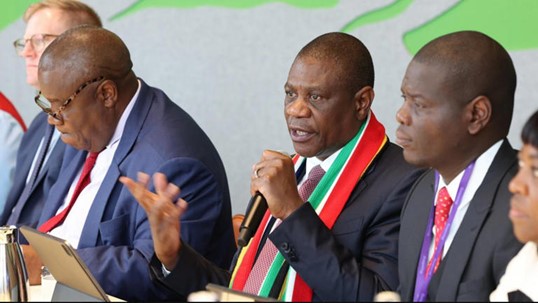When the Government of National Unity (GNU) was formed it was hailed as a ground breaking platform for collaboration among diverse political factions and parties. However, although this sounded good on paper the reality was far different. The source of this perception stems from the ongoing tensions, double standards and the lack of sincere cooperation between its partners.
The GNU was envisioned as a platform for collaboration to address the country’s complex challenges. Yet, many parties, including the DA, often prioritise their political agendas over collective goals. This focus on individual ambitions undermines the spirit of unity that the GNU was meant to embody, rendering it more of an illusion than a functional coalition. The DA’s actions illustrate a broader trend of opportunism within the GNU. While the party advocates for accountability and good governance, it engages in aggressive tactics to unseat its rivals, particularly the ANC. This inconsistency raises questions about their commitment to true collaboration and the ideals of the GNU. Rather than fostering a sense of unity, the GNU has often exacerbated political fragmentation.
The lack of genuine dialogue and the persistence of an “us versus them” mentality have led to increased distrust among coalition partners. This fragmentation hampers effective governance and detracts from addressing the pressing needs of the electorate.
It should be clear that the formation of the “government of national unity” was a marriage of convenience for the parties in question. A clash of egos was going to come to the surface eventually. However, it is up to President Cyril Ramaphosa to reign it in and remind everyone of their participation. The Democratic Alliance led by current Agriculture Minister John Steenhuisen needs to raise their concerns about legislation and government policy in a reasonable manner. Given the DA and the ANC are arguably the largest power brokers in the GNU alongside the IFP they need to rethink their intentions for joining the current divisive governing coalition and decide what they want to do from there. The good of the nation’s unity depends on how the GNU conducts itself.
If these politicians in the GNU from Ramaphosa, to Steenhuisen to Minister Velenkosini Hlabisa (IFP) of the Department of Cooperative Governance and Traditional Affairs care about the GNU they should reconsider the terms of this compromise and why they agreed to it. If it is to serve the people of South Africa then they need to formalise a plan.
One of the primary justifications for the GNU was the promise of stability in governance. However, the constant power struggles and opportunistic manoeuvres among coalition partners have created an unstable political environment. This instability threatens to undermine the foundations of effective governance that the GNU intended to support. For the GNU to transcend its mythical status, there must be a commitment to genuine collaboration among all parties involved. This includes prioritising the interests of the public over political ambition and fostering an environment conducive to constructive dialogue. The GNU, as it currently stands, reflects a myth of unity rather than a reality of effective governance. To embody the principles of cooperation and inclusivity, all parties must re-evaluate their approaches and commit to working together for the greater good. Only then can the GNU fulfil its potential and address the myriad challenges facing South Africa.
Politics if it is not done right can become a volatile mess. If the coalition partners of the GNU genuinely want it to work, they will need to actually cooperate and figure what goals they want to accomplish in the GNU. Instability in the executive branch of government is not good for the health of the nation. The only result is for Ramaphosa to address the members of his cabinet and coalition partners to figure out a solution that satisfies everyone’s rational and reasoning. The GNU is not something mythical like the Lock Ness Monster or a unicorn, it is a functioning part of the body politic. An imperfect functioning part but a functioning part non the less. It may exhibit some ripples of ego and displeasure for the past one hundred days in office but despite the unstable honey moon period the GNU is still here.
Meanwhile Deputy President Paul Mashatile has visited London, the United Kingdom to discuss trade and business.
In Monday, Deputy President Paul Mashatile said that the government is committed to building an inclusive economy in South Africa. Mashatile made this statement at the Bloomberg roundtable discussion in the United Kingdom and further emphasised that the Government of National Unity (GNU) is working around the clock to make SA’s economy more inclusive. “Our people voted for us to collaborate to create better employment opportunities and equal economic growth in all facets of society. The GNU is the best tactical option for us to move the country ahead, putting our differences aside for the benefit of our great nation,” he added.
Mashatile is right about one thing the South African people did vote for the ANC to build an inclusive economy that provides better employment opportunities. As regards to equal economic growth, I am not sure how economic growth can be equal. The reason why Mashatile is in Britain is because, the British have always seen South Africa as being the gateway to Africa’s riches. Since Brexit the U.K have become desperate for new outlets. The South African GNU for its part has the responsibility to come up with a plan to attract free market investment. Now they could easily do this by lowering taxes and tariffs but do they have the will power to do it?
The GNU has an opportunity to pave a new road to success for South Africa. But Ramaphosa needs to reign in the egos of his coalition partners. It may take more than a hundred days for that to happen.
Article written by:
Yacoob Cassim
Journalist at Radio Al Ansaar






